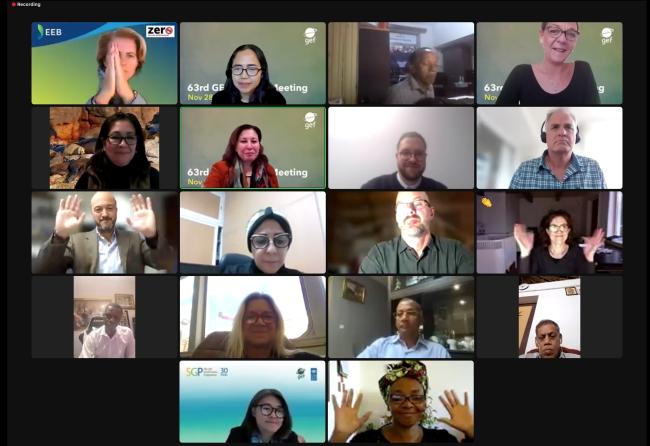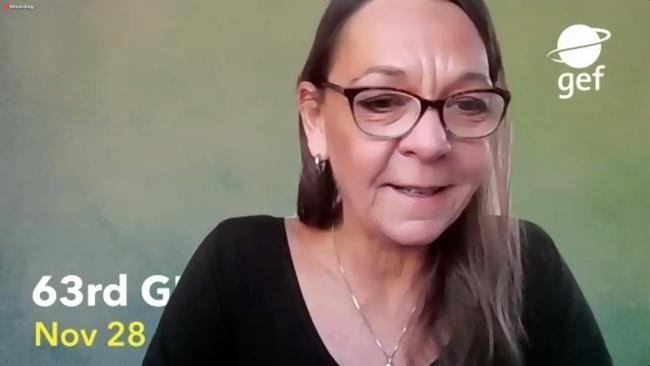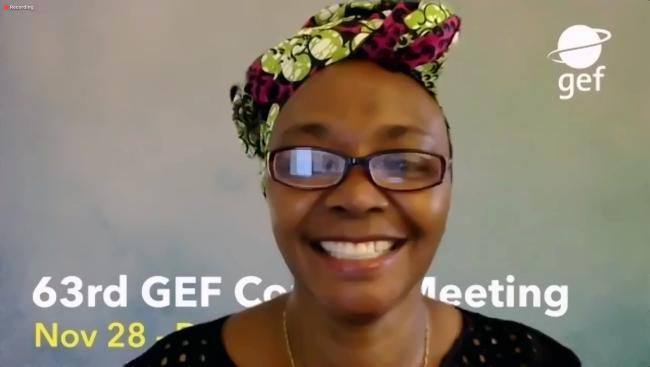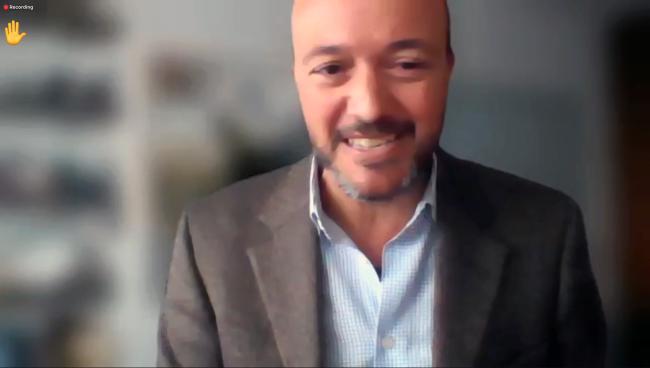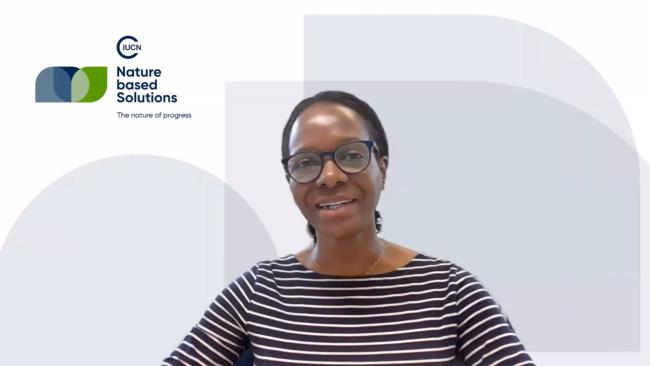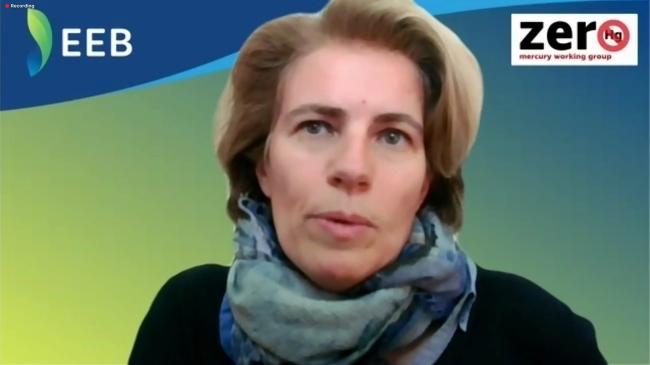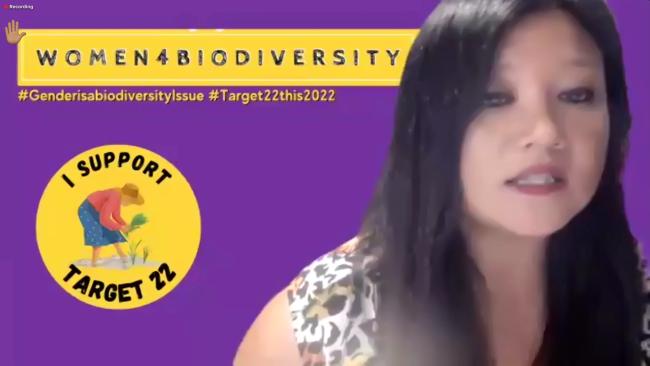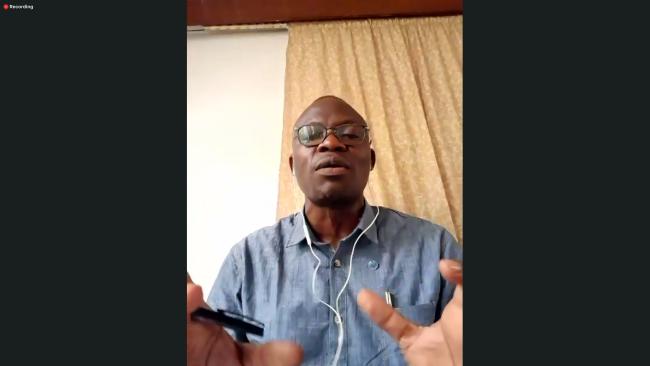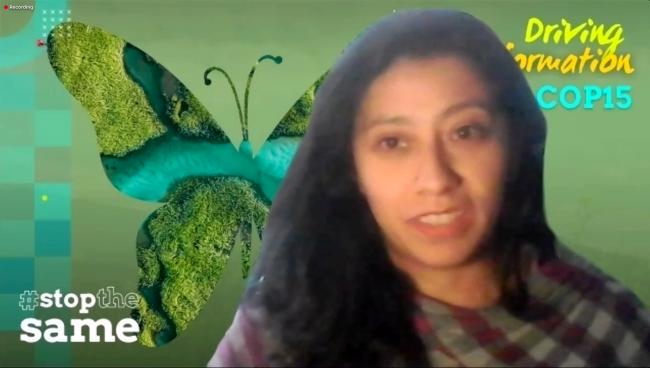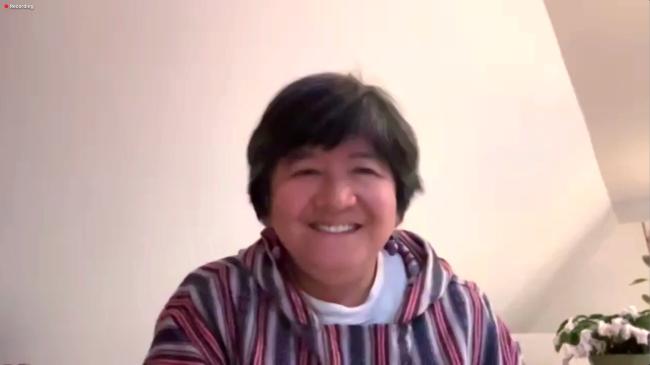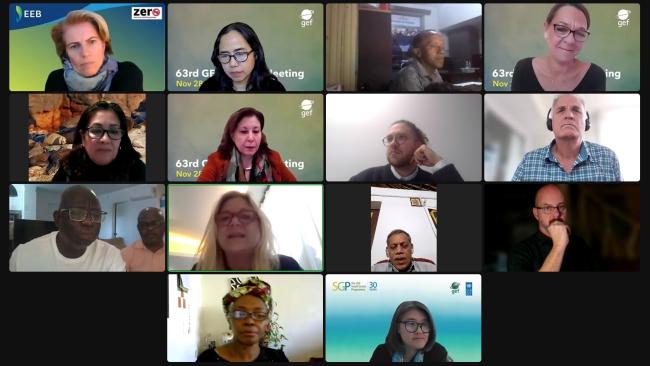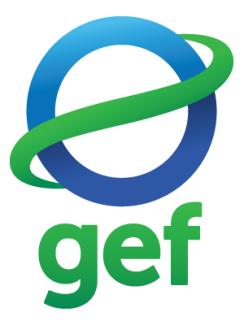About
The Global Environment Facility, civil society organizations, and representatives of multilateral environmental organizations highlight civil society’s important role and participation in implementation of global environmental conventions.
Gabriella Richardson Temm, GEF Secretariat, opened the Global Environment Facility (GEF)-Civil Society Organization (CSO) Consultations on Wednesday, 23 November. Sano Akhteruzzaman, Chair, GEF CSO Network, noted the Network’s traditional role in the GEF Council, GEF Assembly, and Expanded Constituency Workshops, and expressed the Network’s appreciation for recent efforts by the GEF Secretariat to explore new opportunities and ways to further engage civil society at country and regional levels in the eighth replenishment of the GEF Trust Fund (GEF-8).
Akhteruzzaman said the CSO Network wants to:
- position the Network to have a stronger voice, add more value, and complement initiatives in the GEF policy architecture and investments;
- strengthen Network technical capabilities at global, regional and country levels;
- explore ways to engage in convention processes at national level;
- strengthen partnerships with governments in facilitating multi-stakeholder dialogues at national and local levels; and
- collaborate with the Country Support Programme (CSP), Small Grants Programme (SGP), Least Developed Countries Fund (LDCF), Special Climate Change Fund (SCCF) and other funding sources to add value to the GEF-8 commitments.
Carlos Manuel Rodríguez, GEF CEO and Chairperson, noted that the next GEF Assembly, taking place in 2023, will be hosted by the Canadian Government in Vancouver, and said he also wants it to be co-hosted by Vancouver’s First Nations. He said he wants the next Assembly to be a “non-conventional” meeting to reaffirm and define a clear pathway in the relationship between the GEF and the CSOs. He highlighted, inter alia, that:
- the GEF aims for more strategic engagement with CSOs in the implementation of the conventions it serves;
- there is a common vision in the GEF Council that CSOs should play a greater role in the next replenishment; and
- the GEF needs to move towards a more comprehensive approach to working with non-state actors, including youth, women and the private sector.
He said system change means working with the youth - the new generation of leaders - and building on feedback and input from CSOs.
Noting his concern that the SGP currently has half of the projects that it used to have under GEF-5, he highlighted that the downward shift of resources allocated to CSOs has changed. He called for allocating 10% of the GEF budget to CSOs by 2030.
He also drew attention to some projects as examples of expanding CSOs’ efforts in implementing multilateral environmental agreements (MEAs), including the Land Degradation Neutrality (LDN) project under the UN Convention to Combat Desertification (UNCCD).
Corentin Genin, GEF Council Member from Belgium, drew attention to some CSO initiatives that put at the forefront the added value of agroecology. He supported having the CSO Network continue its advocacy in bringing key issues to the forefront for governments' consideration.
Panel 1: Setting the Scene
Susan Waithaka, GEF Secretariat, moderated this panel, inviting panelists to discuss how their organizations support CSO engagement and participation in their meetings and implementation.
Marcos Montoiro, UNCCD Secretariat, outlined achievements of CSOs in bringing important issues to the fore in the work of conventions. He described CSO contributions leading to UNCCD parties adopting a decision on land and land tenure security at the 14th meeting of the Conference of the Parties (COP 14) in 2019, as well as CSO efforts under the climate change regime on the issue of loss and damage. He noted that the UNCCD contains specific articles focusing on the work of non-state actors.
Bora Masumbuko, International Union for Conservation of Nature (IUCN), provided an overview of a recently-approved GEF project on the role of CSOs in achieving LDN, which will be implemented by IUCN. She noted that to achieve LDN, CSOs must be mobilized, particularly those that work “on the ground,” acknowledged the need for increased CSO capacity to achieve this and highlighted that this is the goal of the new project.
Elena Lymberidi-Settimo, Co-Founder and Co-Coordinator, Zero Mercury Working Group, underlined the important role of non-governmental organizations (NGOs) in assisting governments, building capacity, catalyzing discussions, and implementing conventions, but noted the need for access to resources to enable NGOs participate in the conventions and GEF processes.
Chizuru Aoki, GEF Secretariat, outlined some GEF initiatives to promote CSO engagement, highlighting the Inclusive GEF Assembly Challenge Program, which aims to select innovative projects that contribute to the GEF’s goals by systematically involving CSOs, Indigenous Peoples’ groups, youth, and women and girls as stakeholders and solution providers/implementers. She said the selected projects will be recognized and announced at the next GEF Assembly taking place in 2023.
Panel 2: Dialogue on CSO Engagement with MEAs
Andres Falconer, Johns Hopkins Center for Civil Society Studies, moderated this panel. He invited panelists to discuss how best to link GEF CSO engagement with the MEAs’ own CSO engagements and promote cross-fertilization and mutual strengthening.
Mrinalini Rai, Co-coordinator, Convention on Biological Diversity (CBD) Women's Caucus, noted the Caucus is working with other women's groups to strengthen gender equality among the MEAs. She observed gender equality has a strong priority and mandate within the GEF, given its safeguards and policies. Rai stressed the importance of ensuring that funding for CSO work is gender responsive.
Oyéoussi Charles Balogoun, UNCCD CSO Representative, Benin, noted good engagement of the UNCCD Secretariat with NGOs, and suggested other conventions could learn from its example. He stressed that NGOs have on-the-ground contacts and expertise and can contribute significantly to implementation, but more budgetary support and cooperation from local governments are needed.
Mirna Inés Fernández, Global Biodiversity Youth Network, noted that it is easier to obtain funding for youth representation in the COPs than to enable youth groups to participate in convention implementation. She said youth groups often face many bureaucratic barriers to funding their implementation initiatives and urged work to reduce such barriers.
Joan Carling, Global Director, Indigenous People’s Rights International, decried that COP negotiators do not link human rights obligations to the actions they propose, so Indigenous Peoples do not have rights secured that are critical for them to fulfill their recognized role in protecting biodiversity or mitigating and adapting to climate change. Carling noted the memorandum of understanding recently signed with the SGP allocating USD 1 million for community-based renewable energy projects, suggesting it is a good model to upscale to support Indigenous Peoples initiatives in climate change mitigation and adaptation.
During the subsequent discussions, participants exchanged views on different forms of CSO engagement under MEAs and their governing bodies.
Montoiro drew attention to UNCCD Decision 5/COP.15 on the participation and involvement of CSOs in meetings. He noted that, based on this decision, the UNCCD Secretariat and CSO panel representatives inform on achievements, and promote decisions by country governments on how to support CSO participation.
Carling drew attention to the creation of the Indigenous Peoples and Local Communities Platform under the UNFCCC to discuss the contribution of traditional knowledge in climate change mitigation and adaptation. Fernández stressed the need to “be creative with funding” to ensure that it gets down to the ground, particularly to local communities and indigenous peoples. Rai highlighted the key role of the GEF in supporting implementation by, inter alia, operationalizing and strengthening social and environmental safeguards and standards that promote synergies on the ground.
Other participants called for in-depth thinking and changing the current paradigm of the educational system; and recommended that NGOs participate in sharing their experiences with local communities in different networks, including with UN bodies, the IUCN and others.
Reflections and Closing Remarks
Maria Leichner, Vice-Chair, GEF CSO Network, and Founder and President, Fundación ECOS, Uruguay, urged trust building among CSOs, conventions and the GEF, noting that all these bodies have a common agenda. Paola Ridolfi, GEF Secretariat, noted that it is symbolic that the GEF Council meeting always starts with the CSO consultations. She underlined that "the time is now" to bring partnership with CSOs to fruition and to work with these organizations the same way conventions work with governments, noting the need for capacity building, finance, and knowledge sharing, to achieve this objective. On next steps by the GEF, she identified specific windows in the next SGP that will give CSOs access to microfinance to which all implementing agencies within the GEF will have access to.
The CSO Consultation was brought to a close at 10.16 am.
To receive free coverage of global environmental events delivered to your inbox, subscribe to the ENB Update newsletter.

